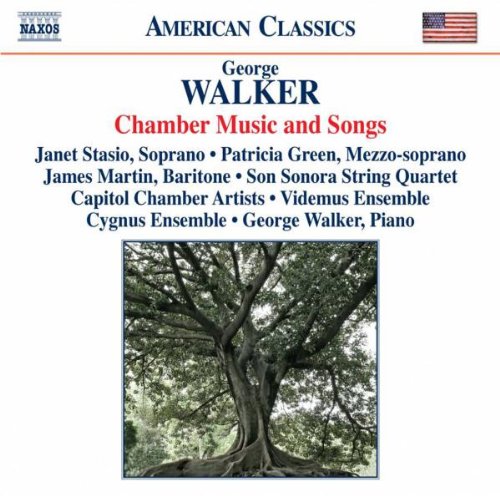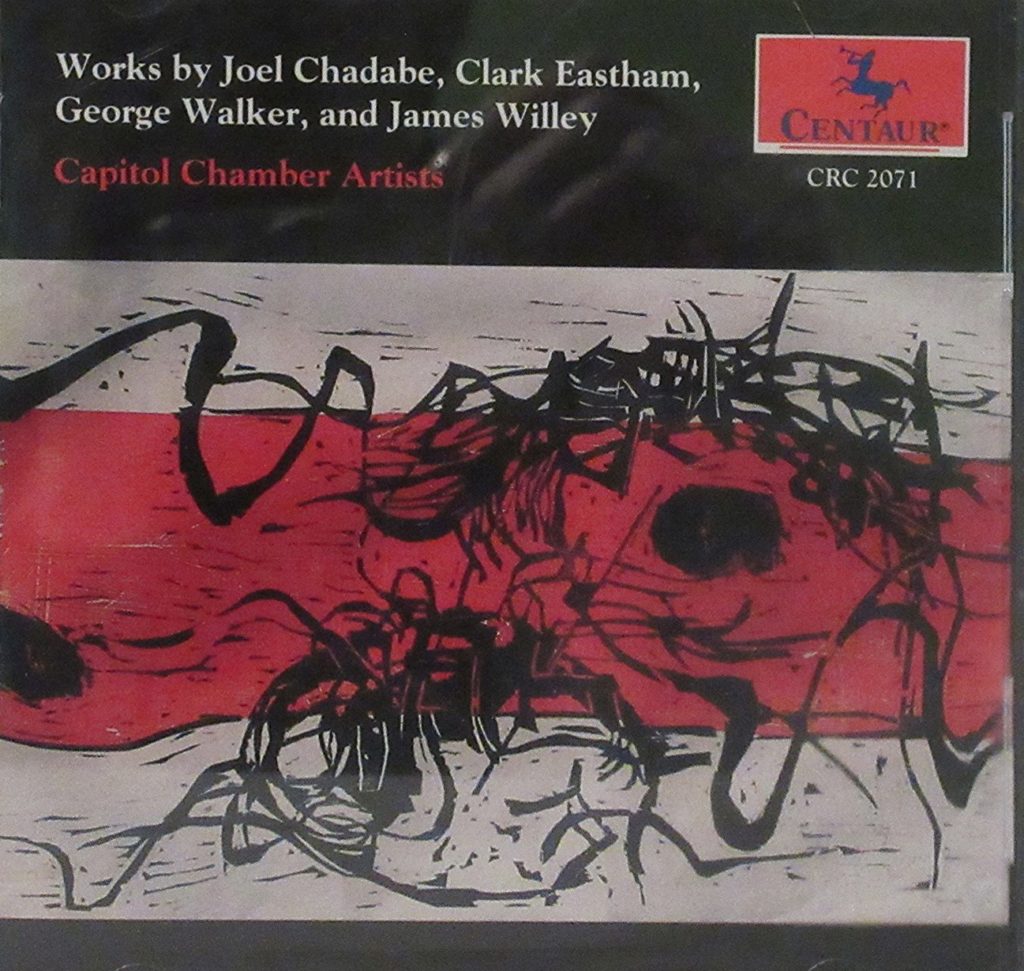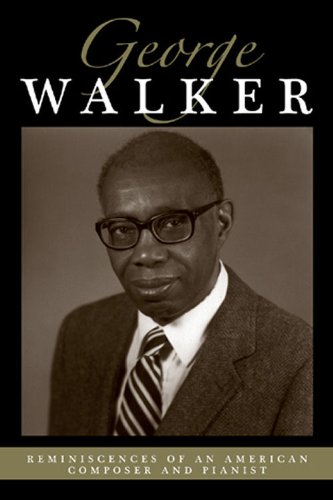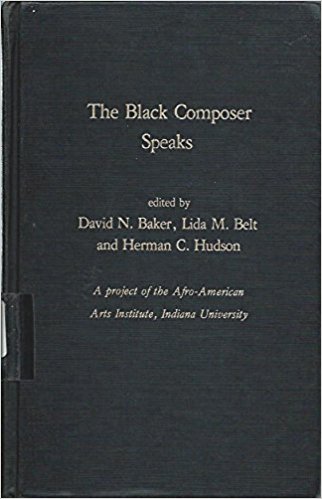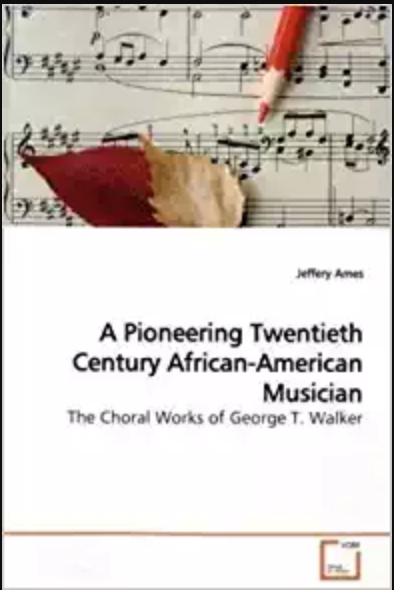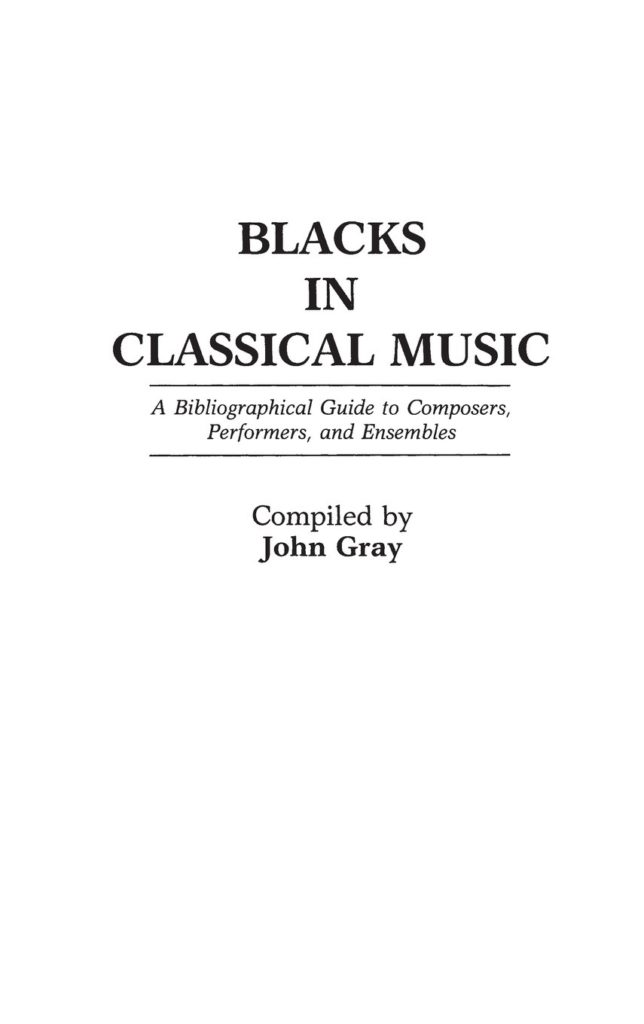Listen
Track:
About
Born in Washington D.C., George Walker began to play piano as a child and studied in the Junior Division of Howard University. He was admitted to Oberlin College following his first public piano recital at the age of 14. He later studied at the Curtis Institute, the American Conservatory, Fontainebleu (with Nadia Boulanger), and the Eastman School of Music, where he earned his D.M.A.
Walker is an accomplished pianist as well as composer, with many performance tours at home and abroad.
He has taught at several universities in the United States, his longest appointment at Rutgers University, from 1969 to 1992. He has received such prestigious fellowships as the Fulbright, Whitney, Guggenheim, Rockefeller and MacDowell. Walker received commissions from both the Boston Symphony Orchestra and the New York Philharmonic.
While serialism is an influence on Walker’s music, he works display aspects of neo-classicism in both texture and form.
George Walker’s songs set the texts of a wide variety of American, English, and Scottish poets, including Robert Burns, Lord Byron, Countee Cullen, Emily Dickinson, Paul Laurence Dunbar, Donald J. Hayes, and A. E. Housman.
–Christie Finn
Source: Guthrie P. Ramsey Jr.’s article in the Grove Dictionary of Music and Musicians
Related Information
Songs
Recordings
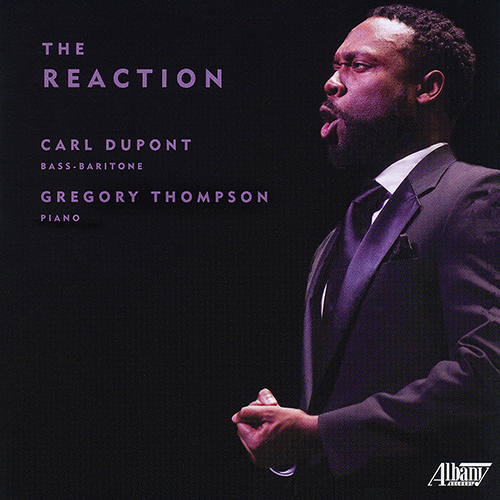
The Reaction
(Marques L. A. Garrett, Jacqueline Hairston, Eugene Hancock, Lena J. McLin, Robert Owens, Carlos Simon, Howard Swanson and George Walker)
2018
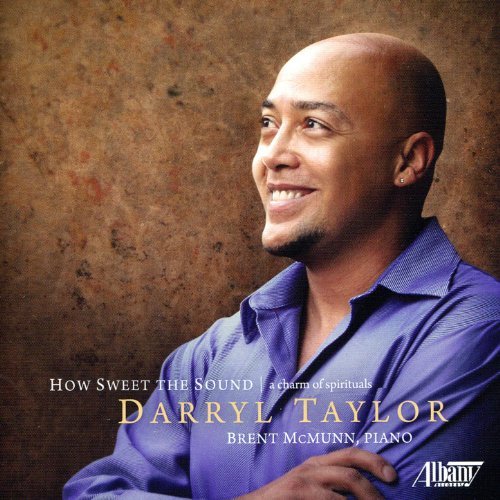
How Sweet the Sound
(Margaret Bonds, Henry T. Burleigh, Maria Thompson Corley, Jacqueline Hairston, Moses Hogan, Hall Johnson, Thomas H. Kerr, Betty Jackson King, Robert L. Morris, Hale Smith, Spiritual and George Walker)
2011
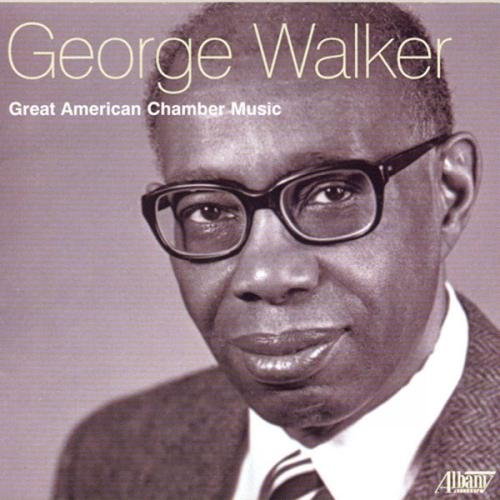
Great American Chamber Music: G. Walker
(George Walker, Emily Dickinson, Paul Laurence Dunbar and William Shakespeare)
2009
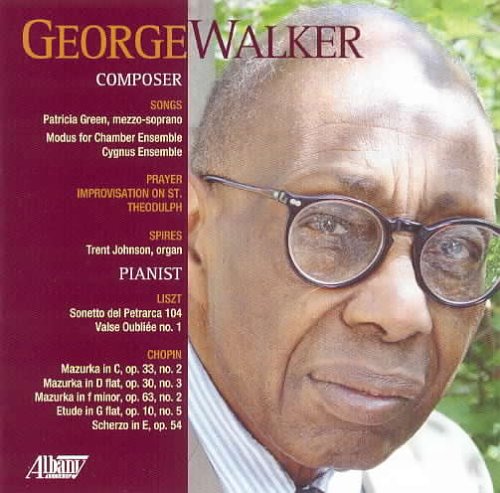
George Walker: Composer
(George Walker)
2005
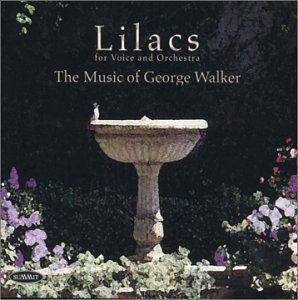
Lilacs: The Music of George Walker
(George Walker)
2000
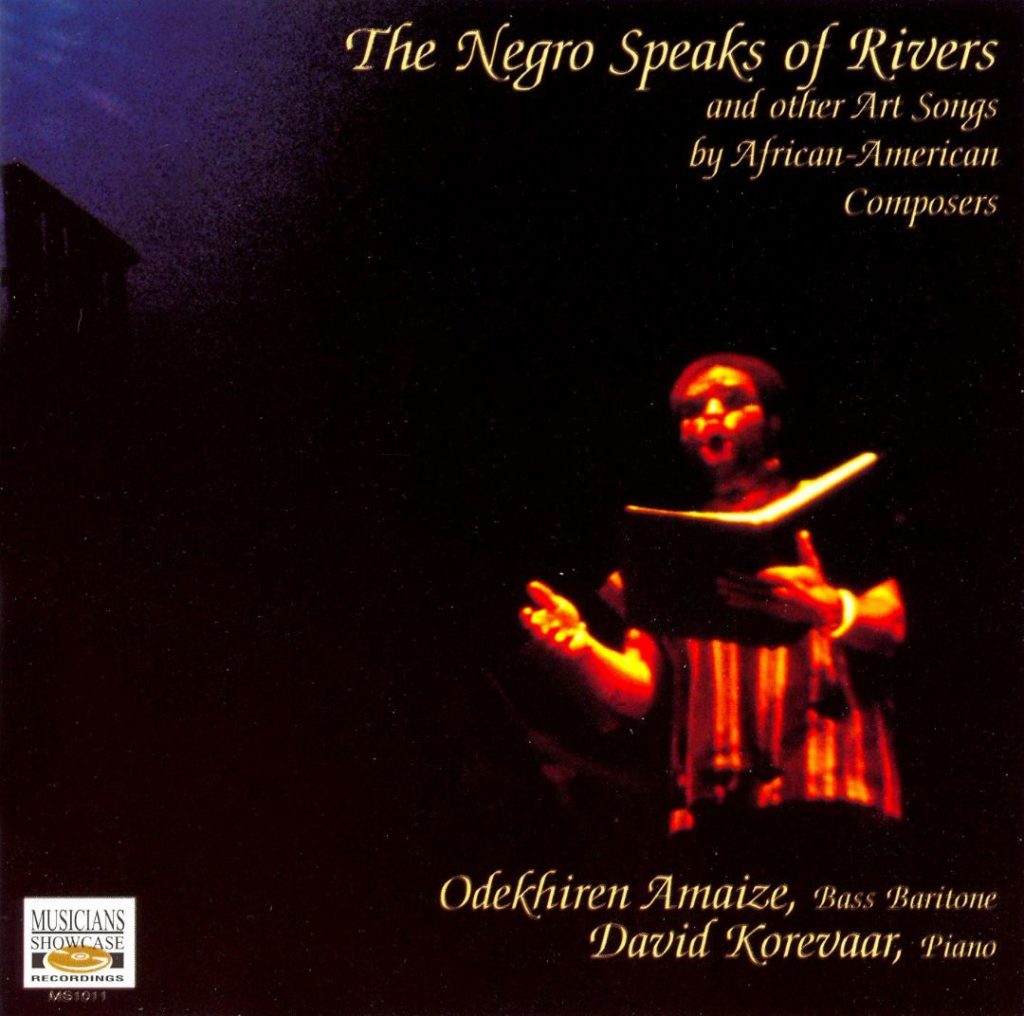
The Negro Speaks of Rivers
(H. Leslie Adams, Margaret Bonds, Charles Samuel Brown, Undine Smith Moore, Robert Owens, George Walker, Howard Swanson, Florence Price, Henry Clay Work and Cecil Cohen)
1998
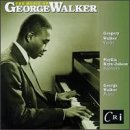
The Music of George Walker
(George Walker)
1996
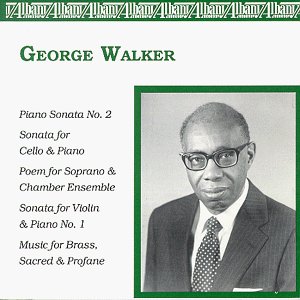
Walker: Chamber Music
(George Walker, Emily Dickinson, Paul Laurence Dunbar and William Shakespeare)
1995
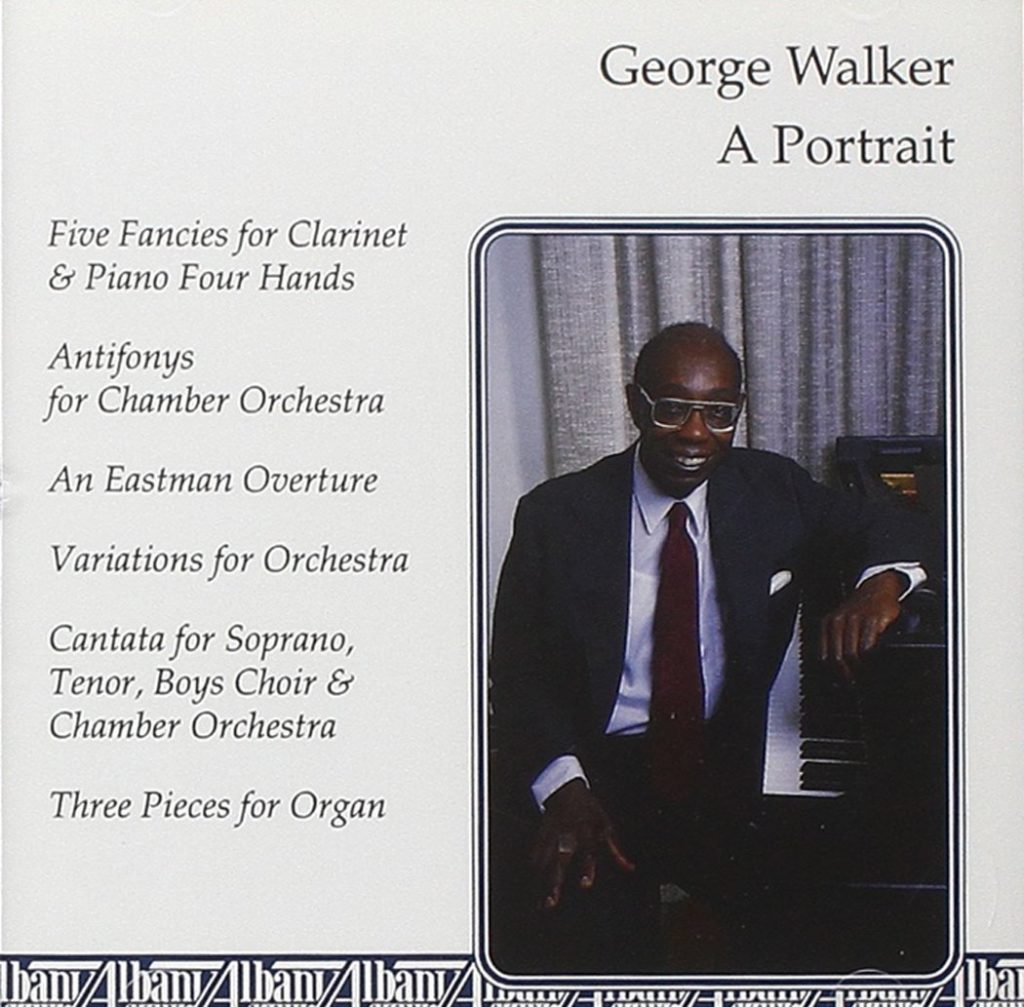
George Walker: A Portrait
(George Walker)
1995
Books
Sheet Music
Anthology of Art Songs by Black American Composers, Compiled by Willis C. Patterson
Composer(s): H. Leslie Adams, David Baker, Margaret Bonds, Charles Brown, Cecil Cohen, Noel de Costa, Mark Fax, Adolphus C. Hailstork, Eugene Hancock, Thomas Kerr, Jr., Charles Lloyd, Jr., Wendell Logan, Maurice McCall, Dorothy Rudd Moore, Undine Smith Moore, Robert Owens, Coleridge-Taylor Perkinson, Florence Price, Hale Smith, William Grant Still, Howard Swanson, George Walker, Olly Wilson, John Work, Jr.
Song(s): For You There is No Song (H. Leslie Adams)
Early in the Mornin' (David Baker)
A Good Assassination Should Be Quiet (David Baker)
Status Symbol (David Baker)
Three Dream Portraits: Minstrel Man; Dream Variations; I, Too (Margaret Bonds)
The Barrier (Charles Brown)
Song Without Words (Charles Brown)
Death of an Old Seaman (Cecil Cohen)
Two Songs for Julie Ju (Noel da Costa)
Cassandra's Lullaby (Mark Fax)
Love (Mark Fax)
A Charm at Parting (Adolphus C. Hailstork)
I Loved You (Adolphus C. Hailstork)
Absalom (Eugene Hancock)
Nunc Dimittis (Eugene Hancock)
Riding to Town (Thomas Kerr, Jr.)
Compensation (Charles Lloyd, Jr.)
If There Be Sorrow (Wendell Logan)
Marrow of My Bone (Wendell Logan)
Chanson Triste (Maurice McCall)
Sweet Sorrow (Maurice McCall)
Weary Blues (Dorothy Rudd Moore)
Love Let the Wind Cry...How I Adore Thee (Undine Moore)
Faithful One (Robert Owens)
Genius Child (Robert Owens)
A Child's Grace (Coleridge-Taylor Perkinson)
Melancholy (Coleridge-Taylor Perkinson)
Night (Florence Price)
Song to the Dark Virgin (Florence Price)
Velvet Shoes (Hale Smith)
Grief (William Grant Still)
A Death Song (Howard Swanson)
I Will Lie Down in Autumn (Howard Swanson)
The Negro Speaks of Rivers (Howard Swanson)
Lament (George Walker)
A Red, Red Rose (George Walker)
Wry Fragments (Olly Wilson)
Dancing in the Sun (John Work, Jr.)
Soliloquy (John Work, Jr.)
An Anthology of African and African Diaspora Songs - 60 Songs
Composer(s): H. Leslie Adams, David N. Baker, Margaret Bonds, Charles Brown, H. T. Burleigh, Valerie Capers, Samuel Coleridge-Taylor, Arthur Cunningham, Harriette Davison Watkins, William Dawson, Mark Fax, Bruce Forsythe, Antônio Carlos Gomes, Adolphus Hailstork, Jacqueline Hairston, Maud Cuney Hare, Jeraldine Herbison, Jonathan Holland, Sylvia Hollifield, Langston Hughes, J. Rosamond Johnson, Thomas Kerr, Lena McLin, Undine Smith Moore, Andre Myers, Camille Nickerson, Fred Onovwerosuoke, Eurydice Osterman, Robert Owens, Coleridge-Taylor Perkinson, Zenobia Powell Perry, Rosephanye Powell, Florence Price, Dave Ragland, Nadine Shanti, Carlos Simon, Hale Smith, Irene Britton Smith, Brandon Spencer, Hilbert Stewart, Howard Swanson, George Walker, Aurelia Young
Song(s): Amazing Grace (H. Leslie Adams)
Christmas Lullaby (H. Leslie Adams)
Sence You Went Away (H. Leslie Adams)
The Heart of a Woman (H. Leslie Adams)
The Alarm Clock (David N. Baker)
The Negro Speaks of Rivers (Margaret Bonds)
Caring (Charles Brown)
Desire (Charles Brown)
Your Eyes So Deep (H. T. Burleigh)
Your Lips Are Wine (H. T. Burleigh)
Autumn (Valerie Capers)
Elëanore (Samuel Coleridge-Taylor)
The Willow Song (Samuel Coleridge-Taylor)
Minakesh (Arthur Cunningham)
Stars (Harriette Davison Watkins)
Out in the Fields (William Dawson)
The Refused (Mark Fax)
With Rue My Heart Is Laden (Bruce Forsythe)
Suspiro d’alma (Antônio Carlos Gomes)
If I Can Stop One Heart from Breaking (Adolphus Hailstork)
Longing (Adolphus Hailstork)
Loveliest of Trees (Adolphus Hailstork)
Dormi, Jesu (Jacqueline Hairston)
Gardé Piti Mulet Là (Maud Cuney Hare)
I’ll Not Forget (Jeraldine Herbison)
Little Elegy (Jonathan Holland)
In Time of Silver Rain (Sylvia Hollifield)
The Founding Fathers (Langston Hughes)
This is My Land (Langston Hughes)
L’il Gal (J. Rosamond Johnson)
Soliloquy (Thomas Kerr)
Amazing Grace (Lena McLin)
The Year’s at the Spring (Lena McLin)
I Am in Doubt (Undine Smith Moore)
I Want to Die While You Love Me (Undine Smith Moore)
For a Poet (Andre Myers)
Chere, Mo Lemmé Toi (Camille Nickerson)
Gué, Gué, Solingaie (Camille Nickerson)
Mshila (Fred Onovwerosuoke)
Entreaty (I Am the Rose of Sharon) (Eurydice Osterman)
Could I but Ride Indefinite (Robert Owens)
Die Nacht (Robert Owens)
From the Dark Tower (Robert Owens)
The Lynching (Robert Owens)
The Secret (Robert Owens)
Madrigal (Coleridge-Taylor Perkinson)
O Children of Men (Zenobia Powell Perry)
I Want to Die While You Love Me (Rosephanye Powell)
Spring (Florence Price)
The Sum (Florence Price)
Martin Luther King, Jr. (Dave Ragland)
Mangez, Boulez (Eat, Drink, Be Merry) (Nadine Shanti)
Prayer (Carlos Simon)
Troubled Woman (Hale Smith)
Why Fades a Dream? (Irene Britton Smith)
Dream Variations (Brandon Spencer)
Spring Song (Hilbert Stewart)
One Day (Howard Swanson)
I Went to Heaven (George Walker)
Norris Swamp (Aurelia Young)
Voice Type: 36 Songs are for High Voice - Medium to High Voice
24 Songs are for Medium - Medium to Low Voice


